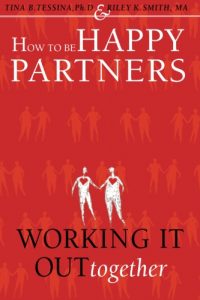Reading Corner
Links related to the weekly posts.
In this week’s blog we wrote about why you need time apart in your relationship. We have some links about this for you.
Be Apart to Stay Together “New research shows that happy long-married couples often say their secret is, “We give each other space.” According to an unpublished study by Terri Orbuch, a psychologist and research professor at the University of Michigan’s Institute for Social Research, having enough space or privacy in a relationship is more important for a couple’s happiness than having a good sex life.”
10 Relationship benefits of spending time away from your partner “If you are part of a couple there are many benefits alone-time can bring to your relationship. Here are some tips for how to make the most of your time with yourself in order to benefit your partnership.”
Why spending time apart is super healthy for your relationship (pdf) “The fact that you are married or committed to each other does not mean that you have to spend all your time together. This is such a common misunderstanding in many couples. They tend to believe that the fact that you spend a week holidays apart or that you have a night out with your friends are signs that something is wrong with your relationship. Not at all!”
Maude and I know from our direct experience that relationships without conflict are possible. This is an uncommon position to take, and many people are doubtful, so it is a pleasure to find similar writings.
 I came across “How to Be a Couple and Still Be Free” by Tina Tessina and Riley Smith in our local library, and was delighted to find a sympathetic view. Chapter 1 starts out: “In 15 years of working with couples in private therapy and workshops, we have found that no matter how unsolvable a problem seems to the couple presenting it, when we help them apply Cooperative Problem Solving, a solution can always be found.”
I came across “How to Be a Couple and Still Be Free” by Tina Tessina and Riley Smith in our local library, and was delighted to find a sympathetic view. Chapter 1 starts out: “In 15 years of working with couples in private therapy and workshops, we have found that no matter how unsolvable a problem seems to the couple presenting it, when we help them apply Cooperative Problem Solving, a solution can always be found.”
How could I not be entranced?
They decry competition: “The belief that someone has to ‘win’ in a relationship encourages us to compete rather than to cooperate,” and offer a detailed procedure: “The unique aspect of Cooperative Problem Solving is that both parties attempting to resolve a conflict or make a decision can negotiate so that both get what they want.” They have, like many therapy books, formalized their approach and include many charts, guidelines and exercises. The Negotiation Tree is a multi-page flowchart guiding you through the steps. You might feel this structured approach to be a useful map or a limiting straitjacket.
Their focus is very much on The Negotiation Tree, which is similar to what we have described as Our Process, and they break it down into five steps:
I liked this book so much, I ordered a second-hand copy from Amazon, and what arrived was the 1987 2nd edition, with the authors’ names reversed. This is a very different book, and although the five steps are identical to the 3rd edition, the guidelines and exercises are not included. It still uses examples of couples working through problems to illustrate its points, and goes into less detail, which in a way makes it clearer.
 Either of these editions will be a rewarding read, and they differ so much that you could start with the 2nd edition and then enjoy the more detailed breakdown in the 3rd edition. They are both out of print, but a new edition is planned for Valentine’s day. Their latest book is How to Be Happy Partners: Working it Out Together, and Dr. Tessina is also the author of many other relationship books.
Either of these editions will be a rewarding read, and they differ so much that you could start with the 2nd edition and then enjoy the more detailed breakdown in the 3rd edition. They are both out of print, but a new edition is planned for Valentine’s day. Their latest book is How to Be Happy Partners: Working it Out Together, and Dr. Tessina is also the author of many other relationship books.
Riley K. Smith, M.A. and Tina B. Tessina, M.A., How to Be a Couple and Still Be Free. 2nd ed. North Hollywood, CA: Newcastle Publishing, 1987.
Tina B. Tessina, Ph.D. and Riley K. Smith, M.A., How to Be a Couple and Still Be Free. 3rd ed. Franklin Lakes, NJ: New Page Books, 2002.
Tina B. Tessina, Ph.D. and Riley K. Smith, M.A., How to Be Happy Partners: Working it out Together. Long Beach, CA: Muffinhaven Press, 2016.
You can find more about the authors at their web sites:
Riley K. Smith, MA, LMFT
Dr. Tina Tessina, PhD, LMFT
In this week’s blog we wrote about commitment. This week’s links discuss various aspects of this topic.
Committed Relationship – What Does That Really Mean? “Commitment also requires that each partner choose it themselves. I don’t believe anyone can force you to commit to something. You can certainly try, but ultimately a true commitment that comes from the heart has to come from each person of their own free will.”
Passion + Intimacy + Commitment = Consummate Love “Passion, intimacy, and commitment are the three pillars of couple-love, says psychologist, Robert Sternberg in his “triangular theory.” We may love based on intimacy, passion, or commitment, or any combination of the three.”
What Committed to a Relationship Means “A deeper level of commitment, the psychologists report, is a much better predictor of lower divorce rates and fewer problems in marriage.”
In this week’s blog we wrote about sacred space, the time spent focused on each other. This week’s links are about that.
The Policy of Undivided Attention “Before you were married, spending time alone with each other was your highest priority. You probably spent the majority of your leisure time together, and the time you spent together was probably the most enjoyable part of every week. But after marriage, like so many other couples, you may find that you can be in the same room together and yet ignore each other emotionally. What’s even worse, you may find that you are not even in the same room together very often, particularly after your children arrived.”
How to Become the Sacred Couple “In this crazy modern world, being in a relationship with a partner sometimes comes second or third in priority to work, or whatever else is occupying your attention. However, it is possible to maintain a sacred relationship in this modern world of multitasking, but it requires an intentional choice on the part of each person in the relationship.”
When Love Is Not Enough: 4 Tips for a Strong Relationship “My husband and I were going through a difficult time a few years ago. It felt like a pivotal time in our relationship. We were not spending any quality time together, nor were we going out together as a couple…. It’s important to set some time aside to just be a couple; spend quality time together regularly, but especially during hard times. This doesn’t need to involve money; just a walk down the park together or along the beach will help. Just taking yourself out of your home environment will be beneficial.”
In this week’s blog we wrote about whether differences are a strength or a weakness in a relationship, and concluded that, except for major differences, they are a positive. This week’s links write about that, including one that is about the benefits of diversity in groups.
The Myth of Irreconcilable Differences “In a court of law, if both partners of a married couple claim they have irreconcilable differences, the court will grant them a legal divorce – without even asking what the differences are! Joyce and I, on the other hand, having worked with thousands of couples over the last 37 years, challenge that there is no such thing as irreconcilable differences. We have seen that ANY difference can be not only tolerated, but even appreciated. But that takes real understanding and a commitment to love.”
How the Differences in Your Relationship Can Be Gifts “It’s in our nature as humans to gravitate towards those who have interests similar to our own. And in many ways, this serves us well. On the other hand, it doesn’t leave much room for experiencing all that life has to offer. By opening ourselves up to another way of living and being, we can make more educated decisions about what we want our own lives to look like. These varied life experiences allow us to express ourselves more fully and be more authentically present in the world.”
How Diversity Makes Us Smarter is about differences in organizations, not between two people, but it offers an interesting different perspective on the same issue. “Decades of research by organizational scientists, psychologists, sociologists, economists and demographers show that socially diverse groups (that is, those with a diversity of race, ethnicity, gender and sexual orientation) are more innovative than homogeneous groups. It seems obvious that a group of people with diverse individual expertise would be better than a homogeneous group at solving complex, nonroutine problems. It is less obvious that social diversity should work in the same way—yet the science shows that it does. This is not only because people with different backgrounds bring new information. Simply interacting with individuals who are different forces group members to prepare better, to anticipate alternative viewpoints and to expect that reaching consensus will take effort.”